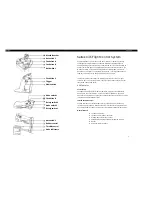
Assembly and installation
7
Fläkt Woods
8877 GB 2017.10.25
Specifications are subject to change without further notice
TWIN WHEEL SYSTEM
Terms for summer
Outdoor temp > condensation point for the humidity set point –
Outs tmp diff summer.
Terms for winter
Outdoor temp < condensation point for the humidity set point –
Outs tmp hys winter.
Alarm inputs
Settings for alarm inputs are adjusted under Digital inputs at
respective function.
MAIN INDEX
Ú
UNIT
Ú
INPUTS
Ú
DIGITAL INPUTS
Alarm outputs
Settings for alarm outputs are adjusted under Digital outputs.
MAIN INDEX
Ú
ALARM HANDLING
ROTORS
Twin Wheel is equipped with two rotors. One sensible (heat
transfer) and one hygroscopic (moist and heat transfer) rotor.
Hygroscopic rotor
For winter mode, the hygroscopic rotor is first in the heating
sequence. It is blocked from the heating sequence during
summer mode, where only the sensible rotor is used. In the
cooling sequence however, the hygroscopic rotor is used
whenever possible. For cooling recovery, the hygroscopic rotor
is run at 100 %. The condition for cooling recovery to start, is
when the outdoor temperature is 2 degrees (default) higher than
the extract air.
Settings for rotors are found at:
MAIN INDEX
Ú
UNIT
Ú
TEMP CONTROL
Ú
HEAT RECOVERY
Parameter
Remark
Alarm output 1
A-alarm output, NO, adjustable
Alarm output 2
B-alarm output, NO, adjustable
Sensible rotor
The sensible rotor regulates so that the supply air temperature
set point is withheld. Under conditions when the sensible rotor
fails to reach the set point, the hygroscopic rotor is used
(if allowed to start).
Rotor settings are found under:
Temperature control
The temperature sequence is independent of the humidity
sequence. The temperature sequence uses both rotors (under
the condition that the current operating mode allows it). When
cooling is needed, the cooling coil is used. When the conditions
for cooling recovery are met, the hygroscopic rotor is used. If the
temperature set point is not reached the controller can call for
external heating to start through a digital output.
Temperature Set Points
The Twin Wheel receives it’s supply air temperature set point
from the AHU as an analogue input. Settings in the controller
regarding how this signal will be translated to a temperature are
done via External Set Point. Log in at service level is required.
MAIN INDEX
Ú
UNIT
Ú
SETPOINTS/SETTINGS
Ú
ALL SETTINGS
Ú
EXTERNAL SET POINT
The temperature set point for cooling is a temperature offset
(dead zone) from the supply air temperature set point. This
setting is set in °C.
MAIN INDEX
Ú
UNIT
Ú
SETPOINTS/SETTINGS
Parameter
Value
Remark
Ext.stpt curve Y1
0 °C
Temperature set point 0
as VDC shall represent.
Ext stpt curve Y2
30 °C
Temperature set point 10
VDC shall represent.
Parameter
Value
Remark
Set Point dead zone
cooling
2 °C
Dead zone between
heating and cooling

































